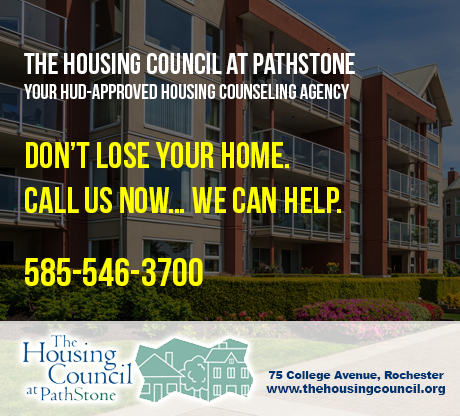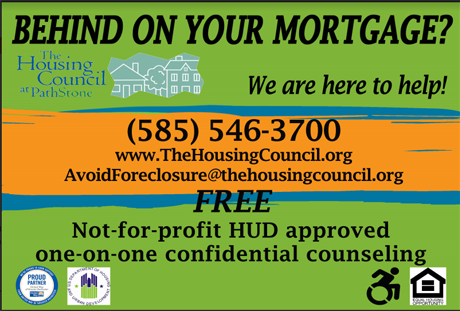Director of The Housing Council at PathStone cites challenges for first-time homebuyers
Calling 2020 a “tumultuous year” for first-time homebuyers, Mary Leo, executive director of The Housing Council at PathStone, today presented the annual report of the agency’s counseling and owner-occupied rehabilitation programs today to the Genesee County Legislature’s Human Services Committee.
“The lack of housing choices … makes it very competitive” for those looking to capitalize on federal programs and banking institutions’ willingness to purchase their first homes, said Leo, an 11-year employee of the agency who was hired as executive director recently.
Leo said 36 of a possible 58 family units that completed a homeownership program were able to close on their first house, which means that 22 graduates are “still out shopping.”
Her report, covering July 1, 2019 through June 30, 2020, indicated that PathStone’s relationships with the United States Department of Agriculture’s Rural Development, Habitat for Humanity and local banks “have resulted in a growing pipeline of referrals to the agency,” which received $12,150 from Genesee County in 2019.
The 36 families able to purchase a home through the program are 15 more than the previous year.
Leo also said that finding one-bedroom apartments is a challenge, with “more (financial) support available than apartments."
She mentioned the agency’s foreclosure prevention arm that resolved 11 pending cases in Genesee County over the past 12 months.
PathStone’s Genesee County Handyman program assisted 92 senior citizens, down from 2018-19 due to a decrease in funding and COVID-19, she said.
“We anticipate a rise in the need for this service in the coming months,” she said.
On the subject of funding, Leo said funding remains “flat or slightly down.”
She explained that the federal Housing and Urban Development agency issues housing awards based on the number of counselors in the office and not on the number of clients served as was the case in previous years. Since Genesee County has just one certified counselor, it has resulted in long wait times for applicants.
Genesee County’s contribution is used for a portion of staffing costs for the homeownership counselor, the deputy of Housing & Grants Programs for grant writing and the county’s Handyman Program. The remaining funds are used for a portion of office space and supplies.
Leo said PathStone has received funding from several other sources, including Genesee County United Way, Key Bank, Citizens Bank, M&T Bank and HUD Housing Counseling.
A funding request also went out to Rochester Area Community Foundation to support the Genesee County Handyman Program, Leo said.
Direct subsidies for first-time buyers include a $300,000 grant from Affordable Housing Corporation for acquisition/rehabilitation, $40,000 from NYS RESTORE and $100,000 from Affordable Housing Corporation for owner-occupied rehabilitation.
In other developments, the Human Services Committee:
-- Approved a contract for $25 per hour, not to exceed $4,500, with Susan Gagne to serve as suicide prevention coalition coordinator through the county’s Community Mental Health Services agency. The pact is set to run through the end of this year.
Mental Health Director Lynda Battaglia said filling this position is “crucial” in light of an increase in attempted suicides since COVID-19.
-- Approved the acceptance of two grants for the Office for the Aging from the Rochester Area Community Foundation’s Muriel H. Marshall Fund – one for $88,000 for centralized intake and the other for marketing coordination. The grants are to be utilized through June 30, 2021.
-- Approved a contract with Tender Loving Family Care Inc., of Webster, for social adult day care services at the rates of $87 per day per person for a five-hour block, $105 per day per person for a full day (9 a.m. to 4 p.m.) and $120 per day per person for an extended full day (7 a.m. to 6 p.m.).
The agreement stipulates that expenses will not exceed $37,750 for the period of July 1, 2020 through June 30, 2021. It is being funded by: $14,040 under Title III-E Respite grant; $18,720 from the Unmet Needs grant; $990 from Expanded In-Home Services for the Elderly grant; and $4,000 from Western New York Alzheimer's Disease Caregiver Support Initiative.


